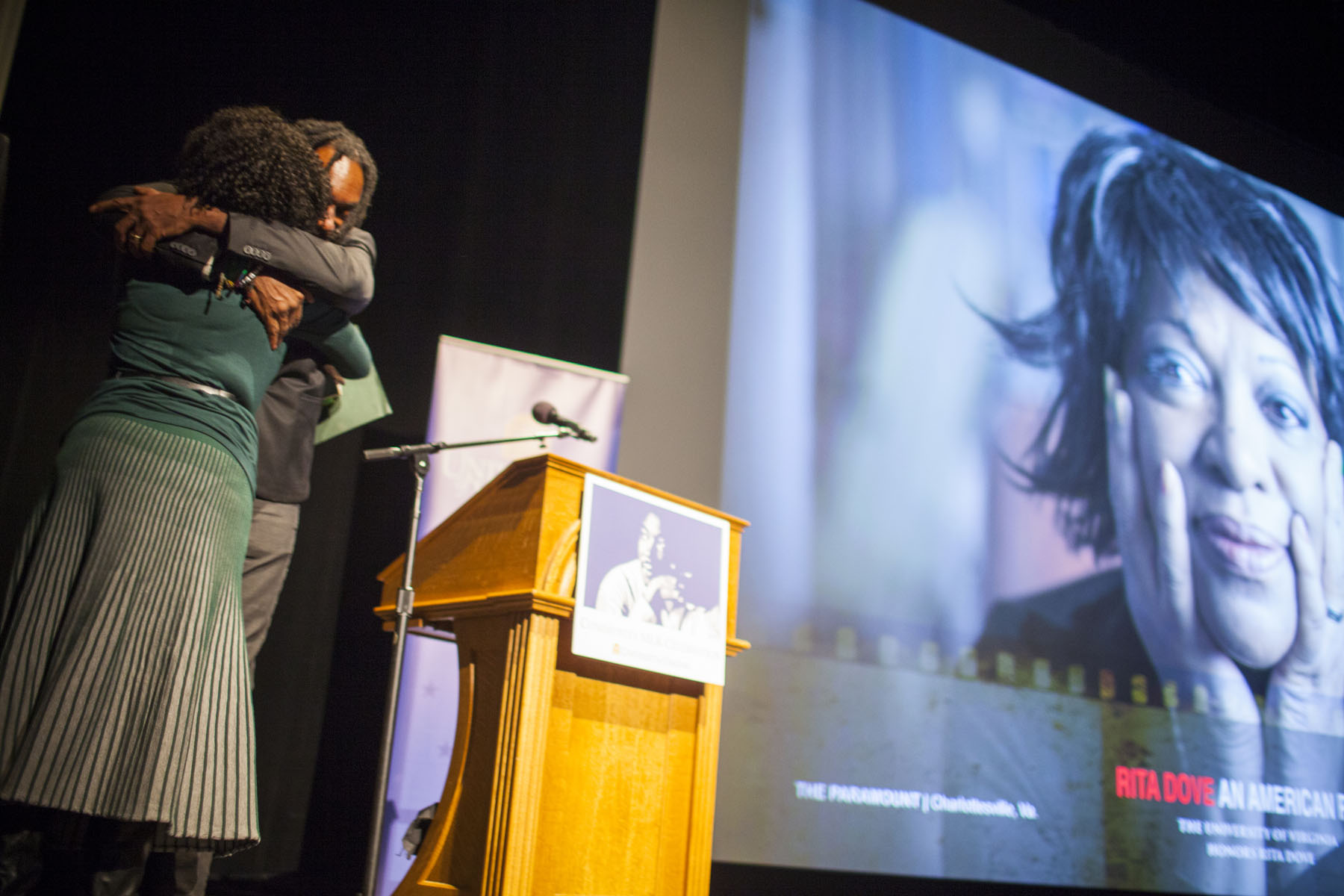If someone is invited to Rita Dove’s house, she’ll give the person directions to get there, but not specifically to get back to town, which could turn into a different adventure, she joked.
That’s what she told filmmaker Eduardo Montes-Bradley when he interviewed Dove for the documentary he made about the University of Virginia Commonwealth Professor of English and Pulitzer Prize-winning poet, which premiered Friday night.
Dove has made a home at U.Va., in Charlottesville and in her remote property in the countryside for 25 years, as Dr. Marcus Martin, U.Va. vice president and chief officer for diversity and equity, pointed out as he introduced “Rita Dove: An American Poet” and Dove herself after the film’s screening. The event capped two weeks of some 25 events organized to commemorate the Rev. Dr. Martin Luther King Jr.’s birthday.
The evening’s events included the film screening; cello music from a Charlottesville High School teenager Faith Brown; remarks by Dave Matthews Band violinist Boyd Tinsley; Dove giving remarks and reading some of her poems; and Dove sitting down with fellow writer Christopher Tilghman, director of U.Va.’s Creative Writing Program, for a short question-and-answer period.
The film’s online summary says it presents “the intimate and noteworthy portrait of a woman who emerged from the profound social transformations of the 1960s as a singular voice and went on to become a distinguished bard, decorated with the highest artistic honors of the nation.”
In the making of the film, Dove gave Montes-Bradley wide access to her life, especially her formative years. The film offers a scrapbook of images and 8-millimeter home-movie clips from Dove’s family archives, interspersed with historic news footage, current-day interviews with Dove at home and scenes of her reading her poems.
“Now you’ve seen me in my majorette uniform,” Dove quipped afterward. As the documentary said, she was the first African-American to be on the majorette team at her Ohio high school in the 1960s.
Film viewers saw Dove as a child with her parents and younger siblings as she grew up in Akron, Ohio. Her father took the family on a car trip to Washington, D.C. for the 1963 March for Jobs, but only he joined the crowd at the National Mall, as her parents decided it might be too unpredictable for children. Still, he wanted his children to know it was an important, historic event, Dove said after the screening.
As a girl and young woman, Dove made some fortuitous choices in her life “and that has made all the difference,” as a Robert Frost poem says. In the documentary, she talks about choosing to play the cello and considering classical music as a career, but then switching her focus to creative writing in college.
In the post-film interview, she told Tilghman that she chose to study German in high school because her father had a book of German poetry on the shelf, and she wanted to be able to read it.
Learning German served her well. She lived in that country as a Fulbright Fellow after college – the documentary included photos of Dove and friends and village life – and later married German-born writer Fred Viebahn, with whom she enjoys ballroom dancing.
The film journey through Dove’s past offered previously unknown glimpses into her life, but as people have come to know, she also shared parts of herself in the poems she read on Friday and as she mingled with guests at the pre-program reception in the Paramount Theater’s elegant lobby.
Tinsley and Dove have worked together on creative projects including Tinsley’s recent film, “Faces in the Mirror.” He marveled at her musical voice – “I love hearing you talk,” he said – and the serendipity of their choices of musical instruments. Tinsley just happened to choose the violin, as Dove just happened to choose the cello.
Dove jumped at the chance to work on the movie Tinsley wanted to make “with childlike excitement,” Tinsley said, turning to her and adding, “You inspired the movie.” After Tinsley played a piece he composed for the “Faces in the Mirror,” Dove wrote a poem in response that also became part of the film.
With Tilghman, Dove talked about her excitement about teaching and seeing students discover their own poetry. They also discussed how music and poetry spring from the same source. Although writing a poem or a song is a solitary activity, sharing it with others requires an element of performance.
Dove said that before a public appearance, she’s so nervous, no one would recognize her. But she has come to know what will happen on stage.
“At a point, you realize it’s not about you. The poetry, the music – it goes through everyone and makes you fearless and weightless,” she said.
The program, sponsored by the Office for Diversity & Equity; Lifetime Learning, Alumni & Parent Engagement; and the Department of English, drew a near-capacity crowd to the 1,000-seat Paramount Theater, with people standing in line for several blocks along the Downtown Mall on a mild-for-January evening while they waited for doors to open.
The event closed the community’s celebration of the life of the Rev. Dr. Martin Luther King Jr. Following this year’s theme, “Looking Back, Moving Forward,” the range of events included the film, “King: A Filmed Record ... From Montgomery to Memphis”; a keynote speech by Michael Eric Dyson on “Dr. King in the 21st Century”; a panel discussion on “Life@UVa: On-Grounds Experiences of People of Color”; a lecture by retired justice of the Supreme Court of Virginia John Charles Thomas, a 1975 U.Va. School of Law alumnus, on the significance of the Civil Rights Act and its 50th anniversary in 2014; and a staged reading of an original work, “I Shall Not Be Moved,” by local author Leslie M. Baskfield and Christopher Baumer, that tells the story of Claudette Colvin, another young woman who, like Rosa Parks, refused to give up her seat on the bus.
Media Contact
Article Information
February 3, 2014
/content/film-about-rita-dove-explores-poet-s-formative-years

